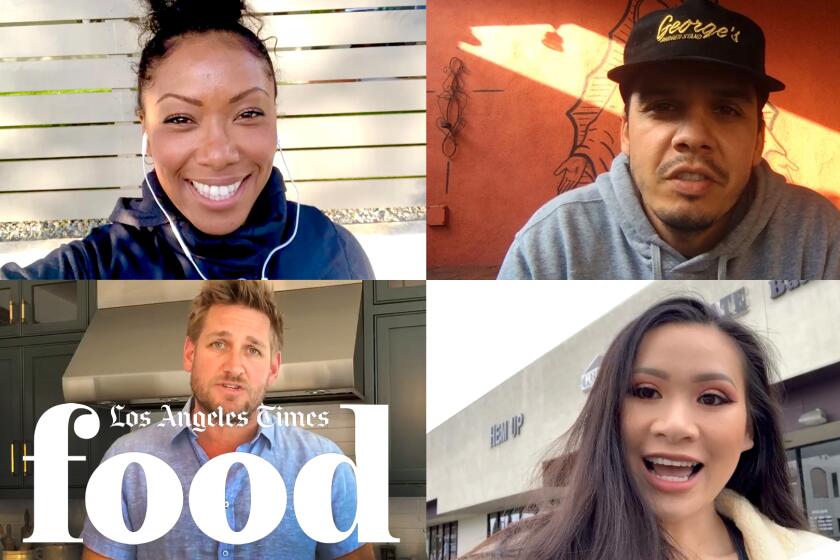Undocumented restaurant workers have no safety net. Here’s how a Boyle Heights charity is stepping up to help
Though layoffs and reduced hours have become a reality for everyone in food service, no group has felt the economic blow of the shutdown of eating and drinking places under “Safer at Home” more acutely than undocumented workers.
According to a 2008 report by the Pew Hispanic Center, 20% of restaurant and bar employees are undocumented, though that number is likely higher in large cities. And despite the fact that most contribute to payroll and unemployment taxes, undocumented workers are ineligible for government benefits, leaving them with no safety net once they’re laid off or furloughed.
“They’re the heart and soul of the entire industry, but they’re also treated as the most expendable,” said Othón Nolasco, one of the founders of No Us Without You, a recently launched charity organization offering aid to undocumented restaurant workers in L.A.
Nolasco, along with business partners Aaron Melendrez and Damian Diaz, is behind Va’La Hospitality, a bar consultancy firm based in Boyle Heights. After two bar projects their firm had consulted on were postponed, the group sought a way to use their time to help the industry they saw collapsing around them.
We asked 15 chefs and restaurant owners in and around L.A. to tell us how they’re doing. This is what they said.
“One of the things we asked ourselves was, who is being left behind in all this? We saw a lot of inspiring things happening for front-of-house employees in terms of GoFundMe pages and fundraisers, but it was frustrating to see no one talking about the back-of-house,” Nolasco said. “The painful truth is that in L.A., and really most of the country, 85% to 90% of those workers are undocumented and they no longer have a paycheck.”
After loading up their truck at wholesale restaurant supplier Canton Food Co., the trio began assembling food packages meant to feed a family of four for a week — five pounds of rice and beans, tortillas, eggs, chorizo, potatoes, milk, fruits and vegetables. Nolasco said they’ve calculated each package costs $33 on their end, a modest price considering what it provides for families that are food-insecure.
No Us Without You launched with a goal of feeding 30 families a week, but as word spread through social media and industry connections, the group saw donations of supplies steadily flow in from produce suppliers, local restaurants and bars and supermarkets such as Northgate González. The Boyle Heights warehouse that had been Va’La Hospitality’s offices is now a de facto distribution center, where bags are packed several times each week and passed out to those in need.
“It’s a small step in terms of what is needed, but it’s a way to show undocumented workers that they’re not being forgotten and there are resources available for them,” Nolasco said.
No Us Without You is currently able to feed 164 families each week, with hopes to grow that number in the future. “We see this as our full-time job — we’re in it for the long haul,” Nolasco said. He expects the charity will continue offering food packages through 2020 and potentially 2021. “This crisis is not going away soon, and it’s only going to get harder the longer it goes. We’re seeing more families reach out as they use up the last of their savings.”
Nolasco, whose fiancé is director of communications for Al Otro Lado, a nonprofit providing free legal aid and representation for deportees, refugees and separated families, said that many resource centers for undocumented residents are currently at capacity or overwhelmed with cases.
Gov. Gavin Newsom said this week that the state legislature is considering passing financial relief for undocumented workers, even as the federal government continues to deploy ICE raids during the pandemic. It’s not clear when any potential measures would take effect.
In the meantime, Nolasco said No Us Without You has applied to become a certified nonprofit, a process that usually takes months. Until then, he said, they’ll continue to offer aid as safely and efficiently as possible.
“We’re in the hospitality industry. It’s our nature to take care of others,” he said. “The workers we’re feeding would rather have a job than a handout, truthfully, but the least we can do now is offer them support in a way that makes them feel dignified.”
More to Read
Eat your way across L.A.
Get our weekly Tasting Notes newsletter for reviews, news and more.
You may occasionally receive promotional content from the Los Angeles Times.











